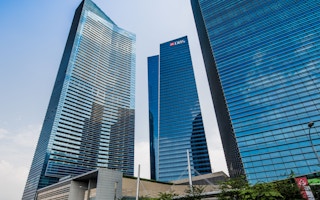DBS, Southeast Asia’s largest banking group, announced on Monday that it has adopted the Equator Principles (EPs), a framework for responsible financing in infrastructure projects.
To continue reading, subscribe to Eco‑Business.
There's something for everyone. We offer a range of subscription plans.
- Access our stories and receive our Insights Weekly newsletter with the free EB Member plan.
- Unlock unlimited access to our content and archive with EB Circle.
- Publish your content with EB Premium.
It is the first bank in Singapore and Southeast Asia to be a signatory to the principles, which provide guidelines for assessing and managing the environmental and social risk of large-scale infrastructure projects.
The Temasek-linked bank joins a list of 101 financial institutions from 38 countries that have signed up to the EPs.
Tan Su Shan, DBS’ group head of institutional banking group, said the bank believed that the region would “see significant infrastructure development over the next few years and financing will play a central role”.
“As that happens, we acknowledge the importance of incorporating environmental and societal considerations into our lending decisions, and to managing our business in a balanced and responsible way, contributing to a more sustainable future,” said Tan.
However, being a signatory to the EPs would mean stepping away from large-scale coal power projects, and DBS continues to finance the massive Vung Ang 2 coal project in central Vietnam.
“
We acknowledge the importance of incorporating environmental and societal considerations into our lending decisions.
Tan Su Shan, group head of institutional banking group, DBS Bank
Large coal power projects such as Vung Ang 2, a planned US$2.2 billion, 1,200-megawatt facility, are defined by the EPs as category A, with “potential significant adverse environmental and social risks and/or impacts that are diverse, irreversible or unprecedented”.
DBS’ financing of Vung Ang 2 is a violation of the Equator Principles. These violations include a failure to ensure that alternatives to Vung Ang 2 are explored, despite the existence of viable, and soon to be cheaper, renewable alternatives to coal power; and failure to ensure that the project sponsors disclose information key for communities to evaluate the impacts of the power station.
Vung Ang 2 is to be constructed on a site near the Formosa Steel plant and the Vung Ang 1 coal plant, both of which have sparked community protests in the past.
Ash and air pollution from the Vung Ang 1 coal power station has polluted fisheries and farms, according to local media reports. Vung Ang 2 will add to the pollution and uncertainty faced by communities in this area, environmentalists including green group Market Forces have said.
DBS has not responded to Eco-Business’ multiple requests for comment.
The news comes as the Equator Principles announced Standard Chartered Bank, which is also financing the Vung Ang 2 plant, as its new chair.
When announcing signing up to the EPs, DBS claimed that it has closed more than S$4 billion (US$2.9 billion) of sustainable finance transactions this year, including green loans, sustainability performance-linked loans and renewable energy financing.
DBS was the first bank in Singapore to draw up a climate policy that rules out financing coal—but only in developed countries, where the bank has barely any presence.
The bank later said it would quit coal once existing deals have been completed by 2021.
Temasek, DBS’ owner, declared its intention to halve the carbon emissions of its portfolio companies by 2030 this week.

















